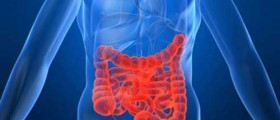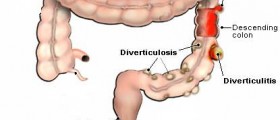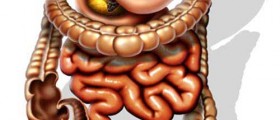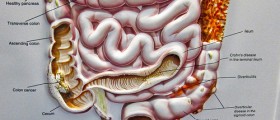
Ulcerative colitis is a chronic inflammatory condition of the large intestine. It features with inflammation of the inner surface of the large intestine and the mucous membrane becomes red, swollen and ulcerated. These changes lead to abdominal pain, cramping, diarrhea and in severe cases rectal bleeding. The condition is usually accompanied by fatigue, loss of appetite and anemia. In some people ulcerative colitis may also lead to joint pain and redness and swelling of the nearby skin as well as liver problems.
It is estimated that approximately 250.000 to 500.000 Americans are suffering from this medical condition. Still the number may be even higher since not all the cases are reported. The disease is predominantly diagnosed under the age of 30. It may also affect children.
Symptoms of Ulcerative Colitis
The most common symptoms of ulcerative colitis are diarrhea and rectal bleeding. However, there is a wide range of symptoms which may vary from patient to patient. This variability is connected with the extent of the disease, to be more precise it depends on how much surface of the colon and rectum are affected. The symptoms are mild if a short segment of the colon is affected and in case the disease is only limited to the rectum.
Ulcerative proctitis is an inflammation of the rectus. It features with intermittent rectal bleeding and this may be the only symptom. In more serious form of the disease patients commonly complain about rectal pain, urgency to defecate and tenesmus (painful and ineffective urge to defecate).
Ulcerative proctosigmoiditis represents inflammation of both, the rectum and the sigmoid colon. The symptoms in this case also include rectal bleeding, defecation urgency and tenesmus. In some patients suffering from proctosigmoiditiis there is a chance of bloody diarrhea and cramps.
The inflammation may also affect other parts of the colon or it spreads to the entire colon causing pan colitis. In pan colitis patients suffer from bloody diarrhea, intensive abdominal pain and cramps, weight loss, fatigue, fever and night sweats. This form of the disease is difficult to treat.
Treatment for Ulcerative Colitis
Ulcerative colitis is treated with medications. The goal of the treatment is to alleviate the symptoms of the disease and bring the patient into remission without flare-ups. Mild and moderate forms of ulcerative colitis usually respond to aminosalicylates. Furthermore, doctors may prescribe corticosteroids such as Prednisone or Hydrocortisone in case there is no improvement after administration of aminosalicylates. In severe cases of the disease patients suffering from ulcerative colitis are prescribed medications that suppress the immune system.
A small percentage of patients undergo surgical removal of the colon and this option is left only for patients suffering from severe form of the disease which has led to irreversible damage to the colon or there are certain complications of the disease such as precancerous lesions.

















Your thoughts on this
Loading...